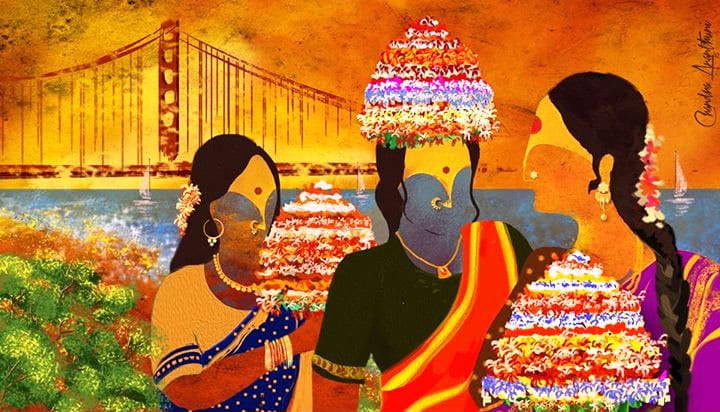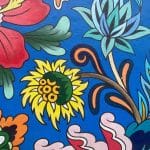

Bathukamma is a colourful floral festival of Telangana and is celebrated by womenfolk with exotic flowers of the region. The festival has over the years became a symbol of Telangana culture and identity. Bathukamma comes during the latter half of monsoon, before the onset of winter.
The monsoon rains usually bring plenty of water into the ponds, tanks of Telangana and it is also the time when wild flowers bloom in various vibrant colours across the uncultivated and barren plains of the region. The most abundant of these flowers are ‘gunuka’ (or ‘gunugu’) and ‘tangedu’. There are other flowers like the ‘banti’, ‘chamanti’, ‘nandi-vardhanam’ etc.
The ‘shilpakka pandlu’ (or ‘sitaphalalu’), custard apples, are another great attraction during this season. The custard apple is tasty fruit that grows in the wild with little or no water and is often called the ‘poor man’s apple’. Then there is corn (‘jonna’ and ‘mokka jonna’) waiting to be harvested.
Amidst these, Bathukamma is celebrated by the womenfolk of Telangana, heralding the beauty of vibrant nature in multitudinous flowers.
The festival begins a week before the ‘Saddula Bathukamma’ (the grand finale of the Bathukamma festival) which falls two days before Dassera. The womenfolk normally get back to their parents’homes from their in-laws and breathe the fresh air of freedom to celebrate the colours of flowers.
For one whole week, they make small ‘Bathukammas’, play around them every evening and immerse them in a nearby water pond. On the last day, menfolk of the house go into the wild plains and gather the flowers like ‘gunuka’ and ‘tangedu’. They bring home bagfuls of these flowers and the entire household sits down to arrange them in stacks.
The flowers are carefully arranged row after row in a brass plate (called ‘taambalam’) in circular rows and in alternate colours. The Bathukamma grows in size and the bigger it gets the better. The white ‘gunuka’ flowers are coloured using water paints and Bathukamma gets colourful circular layers of them along with ‘tangedu’ in between. The Bathukamma is then placed before the family deity and prayers are offered.
As evening approaches the womenfolk dress colorfully in best of their attire and adorn lot of ornaments and place the Batukamma in their courtyard. The women of neighborhood also gather in a large circle around it. They start singing songs by making rounds around them repeatedly, building a beautiful human circle of unity, love, sisterhood.
After playing in circles around the ‘Batukammalu’, before the onset of dusk, the womenfolk carry them on their heads and move as a procession towards a bigger water body near the village or town. The procession is extremely glittering with aptly dressed and decorated women and ‘Bathukammalu’. Songs of folklore are sung in chorus throughout the procession and the streets resonate with them.
Finally, when they reach the water pond the ‘Bathukammalu’ are slowly immersed into water after another round of playing and singing. Then they share the ‘maleeda’ (a dessert made with sugar or raw sugar and corn bread) sweets amongst the family members and neighborhood folks. They return to their homes with empty ‘taambaalam’ singing songs in praise of Bathukamma. The songs of Bathukamma echo in the streets until late night during the entire week.
Bathukamma is a celebration of the inherent relationship human beings share with earth and water. During the entire preceding week, women make ‘boddemma’ (a deity of Gowri ‘mother Durga’ made with earthly mud) along with Bathukamma and immerse it in the pond. This helps reinforce the ponds and helps it retain more water.
The flowers used in Bathukamma have a great quality of purifying water in ponds and tanks and flowers so immersed in abundance are environment friendly.
In times when the fresh water ponds are gradually diminishing and dwindling away, it is indeed a matter of pride for Telangana that its womenfolk (with mostly agrarian background) inherently know how to rejuvenate them by celebrating the festival of flowers.
The festival heralds the beauty of nature, collective spirit of Telangana people, the indomitable spirit of womenfolk and also the ecological spirit of the agrarian people in preserving the natural resources in a festive way.
